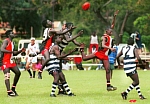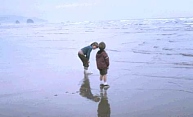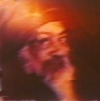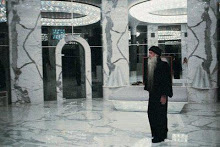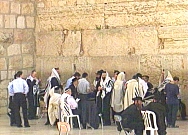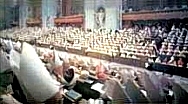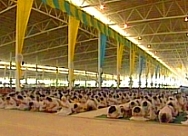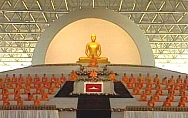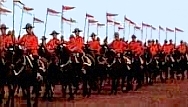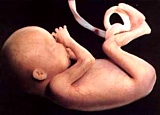|
Selected Writings from Peter’s Journal on People
One of the things that happened to me in this journey into the Human Condition is that my attitude to people underwent a radical change. I think it is a good time to talk a bit about people, because in the previous chapter I have given human beings rather a hard time. I was trying to explain some of the things that motivated me to ‘clean myself up’. Richard put it well the other day when he said that people put on rose-coloured glasses so they do not see the awful world. Seeing that people have grey coloured glasses on in the first place, merely swapping glasses is all a bit silly and it does not work! His remedy is to take both glasses off – and what a wonderful, delightful, actual world is revealed when one takes the risk of eliminating that lost, lonely, frightened and very, very cunning entity that resides within. Of course perfection and purity is here all the time – only now I am closer to experiencing the actuality of it. It is amazing that I now get up in the morning and take it for granted that I will again have a near-perfect day. But it does take effort, commitment, drive, ambition, stubbornness and sheer will power to get there. I called on every one of those attributes whenever I needed them. I remember casually talking to someone about meditation and he said dismissively – ‘Well, what you are into hasn’t even been proven’. That was enough to plunge me deeper into it; a sense of ‘bugger you, then I will prove it is possible’. And if it is possible for me to do then, of course, it is possible for anyone. It is simply a matter of facing and dispensing with the imaginary demons of beliefs, instinctual passions and moralities. Prime among these demons are the ideas about how we relate to other people, be they family, friends, sexual partners, religious groups or whatever. Much of the ‘who’ we think and feel we are, is actually ‘who’ we are in relation to other people – the ‘what do other people think of me?’ syndrome. Peter’s Journal, ‘People’
I remember about twenty years ago there was a lot of talk about the future, when automation and computers would reduce the amount of boring, repetitive and dangerous work humans did. And that then we would all work less and have increased leisure time. Well, that time has come, and suddenly we are calling it unemployment and a crisis! A few years ago I took on a young lad on the building site and he has turned out to be a good carpenter, so I figure he can take my place in the workforce – I’ll take the leisure time. And as for ‘Sustainable’ communities and ecology, I see them as nothing else but sustainable already – they already exist! And in constant change of course, as that is the nature of things. That the universe exists involves no effort on my part. When I get up in the morning I am aware it is here and doing well again. After all, there is no one in charge – there is no-one running this show – it is actually self-sustaining. Peter’s Journal, ‘The Universe’
It is remarkable to look back on my life and my failed attempts to live in companionship with a woman, and then to contemplate the remarkable success I am now enjoying. That this turn-around has happened in only twelve months is equally due to the willingness of my companion to probe into exactly why men and women seem unable to communicate, let alone live together, in peace and harmony. Together we have now made sense of the beliefs and instinctual passions that caused the inevitable previous failures we both experienced and we have now simply removed ourselves from the separate and warring camps that make the ‘battle of the sexes’ an ongoing and inescapable fact of life in man-woman relationships. What a delight it is to live with a woman in easy companionship, where I can simply be myself with no
pretence, no effort, no compromises, no bargains, no bonds. I am with her because I enjoy her company in all the activities we do together; just
in her ‘being around’. It is delightful to have her as a companion. ‘It’s good you’re here’ is our favourite expression to each other.
People around think that we are in love (little do they know!), and that it will wear off, as it always does; or that we are ‘soul mates’,
having by some miracle found the ‘right one’. What we experience in our companionship is the direct result of mutual hard-won effort and not
of some hand of fate or Karma. It is silly to worry whether this will last forever or that, given a change in circumstances, either of us may have
a different companion at some future time. But I live with her as though it will be forever; totally, with no doubt – one hundred percent!
Of course there is an alternative to love, something vastly superior, and I knew it that day I looked out over the ocean. There is an ease, a simplicity and a delight in being in the company of a fellow human being who is equally committed to discovering and permanently experiencing this very perfection that is the physical universe. There is a contentment, satisfaction and exhilaration in knowing we have virtually eliminated sorrow, resentment, jealousy, dependency, moodiness, pining, competitiveness, neediness – indeed, all the emotions and feelings of love. The reward is a near-actual intimacy that is tangible, sensual, priceless, magical, alive, ever-fresh and ever-present. And this direct unfettered experience of the other is both delightful and delicious! We now get to constantly enjoy the fruits of our own labours. Cute hey! We do indeed live in virtual peace and harmony… Peter’s Journal, ‘Love’
I have explained living with the other sex, but having children was an interesting experience. What an extraordinary thing to see a baby emerge into the world, and to see the pain that a woman goes through. What an extraordinary thing that the body is arranged to pump extra amounts of endorphins into the system, but it is also good also to see the relief modern pain-killers bring. I am told that women can have an amazing orgasmic experience when birthing – a good thing as far as I could see. It seemed to me that my role as a parent was, like that of my own parents, to provide comfort and support in the childhood years. Having two kids, it was fascinating to see such different people emerging from a common background and any idea of my intentionally moulding character or influencing behaviour seemed doomed – it was happening anyway. It was also bewildering to see spontaneous, unsolicited outbursts of fear and aggression in my children at times and wonder why. Now I know: we come instinctually ‘wired’ that way – the ‘innocence’ of children is but another unsubstantiated myth. A competency to cope and exist in the world – the very skills of survival – are useful to pass on but beyond that I tried to adopt a ‘hands-off approach’: mostly, I admit, because I felt I had no wisdom to pass on anyway. In the end I could only pass on my father’s advice – ‘be happy’ – not that I knew how to at the time.
I saw in others how much pain that attitude caused – the expectations, the bondage, the resentment on both sides. The last time I met my older son was interesting, as I was able to see quite clearly that here was a young adult with little experience in life, and yet he was so opinionated. He was mostly repeating what he had heard from others and he took it to be true – actual. Given that some of his opinions and values were really my past beliefs, I was able to see – quite shockingly – that ‘who’ we think we are consists of nothing more than the opinions and beliefs of others. I thought then of how I had been at that age – trying to make sense of life and grabbing on to anything that seemed to make sense or had appeal. So what ‘I’ was made up of as a social identity was nothing more than the opinions and beliefs of others – my father’s and those of my father’s generation, which in turn came from their fathers, and so on, back into the dim dark ages of the cave-men and cave-women. This particular experience spurred me on to find out the facts of things, rather than simply believing others. I was determined to find out for myself, to explore, to try something new; anything to break this stranglehold on me. No longer would I trust the opinions of others, no matter how hallowed or learned, sacred or dear to me they appeared. It was to prove a wonderfully freeing experience. The intellectual ‘Giants of Humanity’ became just some guys (usually dead) with a particular opinion, belief or idea, but all of it just another version of the same old stuff. And the famed and holy ‘God-men’ became charlatans, masters of hypnotism, spells, spirits, double talk, and mystical drivel, all with a direct lineage to the witchdoctors of the primitive cavemen. Then the whole concept of any authority outside of me, anything or anyone higher than me, completely disappeared. No more ‘Big Daddy’ or ‘Big Mummy’. What responsibility! But what freedom! Peter’s Journal, ‘People’
We were superior, as we were followers of the ‘Master of Masters’ – the only one! And of course everyone else was a pagan, an unbeliever and needed to see the light. They were not one of ‘us’ and thus were missing out. An arrogance, inherent in being the Chosen Ones, was apparent. With this attitude it is no wonder that resentment grew in the community at large around us, and Rajneesh and those close to him simply added fuel to the fire. And fear is the essential fuel for creating a feeling of love and oneness; after all: no fear – no need for love; no devil – no need for God. While most of this public conflict occurred in America at Rajneeshpuram, we had similar experiences in our commune. We wanted to establish our own school in the country, but ran into vehement local opposition, and of course the press beat up the story, inflaming the issue. In the end the tenders were reluctant to go to the local town even to shop and we would truck down our own food from the city. I remember working all day and then driving the builder’s truck loaded with provisions for a four-hour night drive to the school. I had a girlfriend working at the school and it was all very exciting at the time. We would jump into bed for some furtive sex, sleep for two hours if I was lucky, and then I would drive back and do a day’s work. The sense of being persecuted and the subsequent fear actually strengthened our resolve and made us stronger and more close-knit. We never got to the threat of an armed conflict as on the Ranch, but after four years the verbal abuse and vandalism against us was increasing. I remember at the end of the Ranch we were no longer required to wear red clothes or the necklace, and I took them off real quick. I did not enjoy any more being a target, particularly when I knew we had also incited the persecution. We gave as good as we got. When the Ranch folded I would never again have that same enthusiasm, nor would many others. We had taken it from inspiration, through isolationism and fanaticism, to the brink of martyrdom, until Rajneesh pulled the plug and flew the coup. Peter’s Journal, ‘People’
Image from http://sannyas-spanish-noticias.blogspot.com.au/ I was then offered a job overseeing the building developments in the ashram, with the lure of becoming a Resident – free food, rent paid and other appropriate privileges of rank. I worked closely with the leaders of the ashram, sometimes travelling to Bombay on business, but I became increasingly uncomfortable with the level of politicking and scheming – to put it plainly, power-tripping and ingratiating behaviour. I guess I thought things just ‘happened’ around Rajneesh, but to see this cesspool of power, plotting and intrigue below the surface reminded me of the failure of the Ranch. It came to a head at one particular meeting when suddenly I could see the whole hidden agenda operating beneath the surface. It became glaringly obvious: here was power and corruption again, but this time done by highly skilled ‘operators’, not amateurs. Whether the motive was Good or Evil, Right or Wrong, I simply saw power as power over someone else. And, of course, it had the authority of Rajneesh behind it, which was curious given that he had denied being the power and authority behind the goings-on at the Ranch. So I did the only thing I could to maintain my integrity: I quit. Peter’s Journal, ‘Spiritual Search’
About this time I started to come to grips with an undercurrent of feelings that had been welling up in me as I got further along this path to freedom. As I began to increasingly understand the full extent of what Richard had discovered, I had begun quite cunningly to plot my role in the Movement that would sweep the world. Images of money and fame began to subtly occur – and sometimes not so subtly. I would see myself travelling and talking to halls full of people, spreading the message! Yes, it was good old power and authority again – the attraction of the Glamour, Glory and Glitz. No wonder the Enlightened Ones are seduced and then trapped by it! It seemed to me an instinctual grab for power by my psyche, which rightly felt threatened with elimination. I also had to admit to myself that power and authority was a definite attraction in my desire for Enlightenment – a sort of spiritual version of ‘Money for nothing and your chicks for free’. It was further brought home to me in my situation with Vineeto, as I would try to tell her where she was wrong and ram it down her throat. Finally I saw that it was up to her to do what she wanted to do with her life, and that I had no power over her. Now I would not want it any other way; it would not be perfect otherwise. A similar thing happened with friends when I tried to inspire them; they usually felt attacked and no wonder – this path is anathema to the ‘self’. To see power and authority in myself and to have seen them in the Enlightened Ones was to prove the critical point in the process of beginning to eliminate them in me. Peter’s Journal, ‘God’
Sorrow was easy to see in operation in my life – it is a sad world full of suffering, and I have felt the bitter-sweetness of suffering as a human being. Indeed, being and feeling sad is held up as the essence of being human. ‘Life wasn’t meant to be easy’, ‘It was hard but I learnt a lot’, ‘No pain – no gain’ – all those sayings bear witness to the exalted place that suffering holds in our psyche. I also knew and recognised the self-indulgence of prolonging grief, of soliciting sympathy or – better still – empathy from someone else for the sorrow and sadness in me. To cry on someone’s shoulder or to have someone cry on yours is considered a noble bond – to have a best friend that one can share one’s deepest sorrow with. (...) Malice is a bit different as it is generally not upheld as a human virtue and most people even manage to deny it in themselves. It is always someone else who is cruel, jealous, vindictive or violent and I am simply responding to their malice! It was amazing to see in my own children unprovoked and unlearned acts of aggression. The idea that children are born innocent is just an idea, not a fact. I have some memories, even as a kid, of plotting revenge against someone – but of course most of the actual malicious actions were condemned. One didn’t break things, hit people, or say certain things – I was taught to behave ‘properly’. The trouble is, all the malice was then forced into cunning, clever and subversive actions that were to persist in my life. The willingness to tell a tale on someone as a subtle revenge is a classic. We call it gossiping, to disguise the maliciousness. I remember a few times actually having to will myself to stop, biting my tongue. The worst situation, of course, is in ‘relation-ship’ (or ‘battle-ship’) with a woman. The malice often took the form of withdrawal – an insidious revenge, but also a self-inflicted pain; a terrible price to pay in the long run. I came to see a lot of New Age-spiritual-therapy behaviour as only thinly disguised malice. ‘I have to be honest with you’ or ‘I would like to share something with you’ is usually the opening line of someone who is about to take revenge or be spiteful. Again much of what we humans regard as entertainment is but our pleasure at witnessing malice and violence inflicted upon fellow human beings. Competitive sport is another arena for malice to be played out, whether watching or participating. A few times in my life the lid would really fly off and rage would surface, quickly followed by shame. In particular I remember a time when we were working with some Indian stonemasons in Poona. One of the workers was doing something wrong despite my having just warned him. Well, I gave him a full serve of rage, only to discover afterwards that he really was doing it right all along. I was deeply ashamed, not only that I had lost my temper, but that I had done the typical thing at the time – chosen an Indian as my victim. A few months ago I even felt the thrill of what it would be like to kill someone, after reading a newspaper article about a murder, and that really brought malice home to me. To experience it in me that intensely was shocking indeed. Peter’s Journal, ‘Intelligence’
I remember a major turning point came for me when I realised I was causing ‘ripples’ for other people by my every action: however subtle sometimes, however unintentional, however well meaning, but ‘ripples’ nevertheless. And by seeing it I wanted it to stop! It became yet another motivation to do all I could to aim to eliminate my ‘self’. I wanted not only peace for myself, but for others too. That is why I stopped battling with Vineeto. To want her to change is the traditional ‘it’s the other’s fault’ syndrome. No, if I wanted peace with her, it was up to me entirely. It had nothing to do with her – it was what I wanted, and what I could do, that mattered. So if I want peace in the world, it has nothing to do with anyone else; I simply need to do whatever I need to do to become a non-contributor to malice and sorrow on the planet. It is up to me, not anyone else. If I can’t do it – how can I expect anyone else to do it? But if I can do it then anyone else can! Cute, hey! I have had people accuse me of not caring about the world. I find this curious because caring about the world is one of the major burning drives in my life and a major motive for ridding myself of malice and sorrow as much as possible. (...) Ultimately I was seeking peace for myself, of course, but I found it extremely useful to gather as much motive and intent as possible. It can be useful fuel or ‘back pressure’, as Richard calls it. And what better motive to find peace for myself than to become a non-contributor to the malice and violence on this fair planet. To prove peace as an actual fact – for it not to forever remain a hope or an ideal. Isn’t it extraordinary that it is now possible? I’m not asking you to believe me: but I’m unabashedly trying to inspire or seduce you to ‘give it a go’. Peter’s Journal, ‘Peace’
The means to finding peace for oneself and harmony in living with others is actually so simple and easy. In fact it is devastatingly easy; it weakens and virtually eliminates malice and sorrow. In large part it involves looking at the facts of living as a human on this earth and courageously investigating all of the societal beliefs held as sacred or set in concrete. We, as human beings, seem to intrinsically know that something is wrong. Is life really a sick joke? Are human beings doomed to forever live in misery, suffering and violence; living in eternal hope that some imaginary God will come back to stop the suffering? Is this really some sort of halfway house where we have to suffer rightly according to some Ancient Wisdom of some long dead Guru or mythical God? Is the best that we can aspire to become either a Saint or an Enlightened One – those appallingly arrogant and deluded God-men? Or are we part of some vast cosmic game-plan in which the Chosen few will be whisked away to some utopia either in this universe or another? Of course not!
So I’m writing my story, as an ordinary human being, one of 5.8 billion others on the planet. I’m not driven to proselytise or save the planet – it’s just that somewhere there may be another Peter or Vineeto who would risk trying something new. I was, after all, lost, lonely, frightened and very, very cunning – the only difference is that I chose to admit it. I accepted responsibility for actively contributing to the endemic violence and suffering. And I wanted to change. I knew, as everybody else does, that something was wrong. Why when I had everything I wanted, wasn’t I happy? And why, despite my best efforts, did I hurt other people? And why did the tried and true methods to find happiness – religion and spirituality – fail again and again? So in the end it simply meant going off down a new track – trying something new. I literally had ‘nothing left to lose’ except more and more of the same second rate life – and then I’d die. I did ask for a while ‘well, why me?’ and ‘how come no one else?’ But when I started to reap the benefits of freeing myself the question of doubts or delays were irrelevant. It is in the end setting in motion a willing extinction of what one comes to experience as a malicious and sorrowful social and instinctual identity who is totally opposed to my being here, as this body only. So I am writing of my own experiences, of the facts of being a human being, and of what sense I have made of living on this wonderful planet. The very act of writing this book is indeed part of that making sense. I am very aware it is something I do for myself, a sorting out of an exhilarating journey down ‘a wide and wondrous path’. And it may well be that this story offers someone else a ‘crack in the door’ of the insidious belief system that plagues humanity. If not you, then there will be others – this evolutionary change in human nature is destined to eventually spread throughout the world like a chain letter. However, I am under no illusion that this will happen quickly, as can be evidenced by peoples’ reactions to Richard over the years. An initial curiosity is quickly replaced by a ‘dash for the door’ when it becomes obvious that to become happy and harmless would involve change! I heard recently of a tribe of South American Indians who all suffer from an untreatable genetic disease that is causing their extinction. Doctors took gene samples with the hope of finding a cure but the elders refused to cooperate and said no because it would involve the tribe changing and they wanted to stay as they were.
By seeing the facts of what it is to be a human being I now associate with people in an entirely new way. Gone is the need for ‘friends’ to share my sorrow with. Gone is the need to be part of a ‘group’ as a protection from imaginary fears, or for the sharing of common beliefs. Gone is the need for someone to look after me, someone to care and support me. I have no need for love as a temporary bridge to overcome the feelings of loneliness and separation. I have always been on my own and looked after myself very well in my life, and people have simply come and gone, for varying periods of time and involvement. It’s only that now I don’t have any pretences or bargains, where I do something for someone only in return for their helping me. Now if someone does something for me it is an unexpected bonus and if I do something for someone else it is a pleasure, freely given. I am, for the first time, beginning to live my own life, not someone else’s. The bargains, bonds, deals, clinging and neediness have all but disappeared. I now regard allowing freedom, as far superior to giving love, with its accompanying needs and expectations. To allow anyone I meet to be free of me, as I am free of them. A free association. I am now able to enjoy and delight in the company of my fellow human beings for as long as is appropriate. It may be rather constantly with Vineeto, or briefly with the check-out girl at the local supermarket. However, I am under no illusion, and know that the essential nature of people is malicious and sorrowful; in fact, now it is even more obvious to me, so well do I now know the Human Condition. I am now free to take people as I find them, without investment or expectation, suspicion or competition, attack or defence. Consequently my interactions are invariably delightful and interesting. I harbour no hidden suspicions or doubts, fears, secrets or ulterior motives – those feelings we usually label as ‘intuition’. What you see is sincerely what you get. It is such a relief not to have to battle it out or herd together with others in order to ‘survive’. What I have found is that this is the only game to play in town, and it’s called actually becoming happy and harmless, not just pretending or avoiding. I become more free incrementally, as each belief is replaced with the facts. If something pops up that is preventing my happiness or causing me to be harmful to others right now then I have something else to look at. And I simply work my way through the list… Then the day will eventually come when being happy and harmless is my very nature, rather than being malicious and sorrowful, as is Human Nature. Only then it will be effortless – once my part is done. It is indeed a wide and wondrous path to freedom… Peter’s Journal, ‘People’ Freedom from the Human Condition – Happy and Harmless Peter’s Text ©The Actual Freedom Trust: 1997-. All Rights Reserved. Disclaimer |

